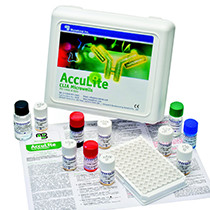|
|

Immunoglobulin E (IgE) is a protein associated with allergic reactions; it is normally found in very small amounts in the blood. IgE is an antibody that functions as part of the body’s immune system, its defense against “intruders.” When someone with a predisposition to allergies is exposed to a potential allergen (such as food, grass, or animal dander) for the first time, they become sensitized. Their body perceives the potential allergen as a foreign substance and produces a specific IgE antibody that binds to mast cells (specialized cells in your tissues) and basophils (a type of white blood cell) in your blood stream. The mast cells are found in tissues throughout your body but are highest in concentration in your skin, respiratory system, and gastrointestinal tract. With the next exposure, these attached IgE antibodies recognize the allergen and cause the mast and basophil cells to release histamine and other chemicals, resulting in an allergic reaction that begins at the exposure site.
READ MORE
AccuBind® ELISA

Available Materials
Item
Description
Price
Qty
Order
Product Specs
Method:
Enzyme Immunoassay, Colormetric
Principle:
Sandwich Assay, Streptavidin-Coated Plate
Calibrators:
0, 5, 25, 50, 150, 400 lU/ml (2nd IRP 75/502)
AccuLite® CLIA

Available Materials
Item
Description
Price
Qty
Order
Product Specs
Method:
Enzyme Immunoassay, Chemiluminescence
Principle:
Sandwich Assay, Streptavidin-Coated Plate
Calibrators:
0, 5, 25, 50, 150, 400 lU/ml (2nd IRP 75/502)
|
|
|